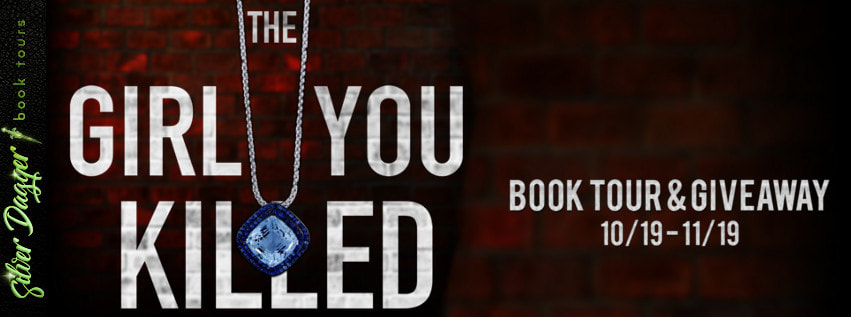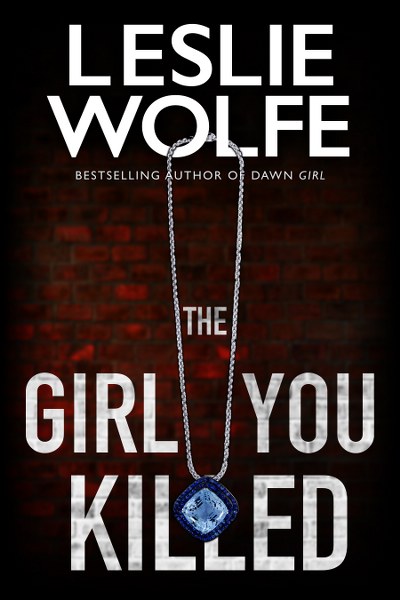The Girl You Killed
by Leslie Wolfe
Genre: Psychological Thriller
“When
an author spins a
story that draws you in and keeps you drawn in
until you finish the book, you know you will enjoy reading anything
written by that author!” – Diane ⭐⭐⭐⭐⭐
Andrea
Brafford’s life is nearly perfect. A passionate marine biologist,
happily married to Craig, the man she loves, recently moved into a
home commensurate with their success to enjoy a life many others only
dream about, in one of Houston’s most desirable suburbs. But only a
few months later, a trial that dramatically polarizes their town
names Craig Brafford as a defendant in the murder of his young wife,
shattering the serenity of the peaceful community.
Andi’s
name is on everyone’s lips, her relationships exposed and torn to
shreds in a highly publicized case that has everyone’s eyes glued
to the internet. Andrea’s life remains a mystery that investigators
and public opinion equally fail to solve. Was she the happy, devoted
wife she'd made everyone believe she was?
Only
she can answer that question.
The
best-selling author of Dawn
Girl is
back with a suspenseful, gripping psychological thriller. Fans of
Celeste Ng, Alex Michaelides, and Liane Moriarty will enjoy The
Girl You Killed,
an addictive psychological thriller that will keep readers enthralled
until the last page.
**Only .99 cents!!**
A Letter
They’d taken everything from him.
In a matter of days, Craig Brafford’s entire world had been torn apart, pulled inside out, shredded to
unrecognizable bits in hues of nightmare.
About half a dozen cops had rummaged through his house looking for who knows what, sparing
nothing and breaking stuff out of spite. Now the place was empty, front door unlocked, an invitation for local thugs to loot and occupy as soon as his arrest hit the evening news. He’d begged his lawyer, the widely successful Lamar Goodridge, to swing by and lock it, maybe turn on the alarm system.
“Not my job,” the man had answered calmly, his voice low, frozen, loaded with contempt. “You can
barely afford my services as it is,” he’d added, glancing at the gold watch adorning his wrist. The man
charged $900 per hour, and he would’ve gladly paid for his time, but Mr. Goodridge couldn’t let himself be caught giving a crap about one of his clients, or running errands for them.
Humiliated, he’d lowered his head and never mentioned it again, cringing powerlessly at the thought
of his beautiful home overtaken by hordes of street filth. Goodridge had taken his case on a retainer that had cleaned Craig’s accounts. Regardless, Goodridge still frowned when he looked at him, as if the sight of the inmate clad in an orange jumpsuit was offensive somehow, as if he’d never seen inmates before.
Maybe Goodridge was wondering if Craig could pay his legal bills once the ordeal was over. Or perhaps
he was trying to guess if his client had done it or not, although Goodridge himself had started their first meeting by saying, “I don’t care if you’re innocent. Either way, you deserve the best defense money can buy. Your money that is. Otherwise…” He let the word trail into silence, accompanied by a shrug and a hand gesture conveying his indifference for all the potentially innocent people who couldn’t afford decent legal representation and would lose their freedom for that only reason: not being rich enough. Even if they were innocent.
He was smug, his lawyer. He rarely worked pro bono cases, and when he did, he only represented
black defendants, “a tribute to his ancestry,” in his own words. His inquisitive eyes drilled into the very
fabric of whoever sat across from him, and there was little he didn’t see. That was probably why he could charge that much or why he rarely lost a case.
His retainer had left no bail money to be posted; Craig was tapped out. The five-hundred-thousanddollar bail could’ve just as well been five million. Too proud and too ashamed to ask for help from affluent people he knew, he braced himself for weeks of confinement. With a swift drop of the judge’s gavel, he’d been remanded, his attorney shrugging off his concerns about the time he’d have to spend behind bars awaiting trial.
Then he was hauled over to the Houston Southeast Jail, where he was locked up with the general
population.
He’d assumed innocent until proven guilty would somehow apply to his time in lockup. He’d been
sorely wrong. With the expedience and efficiency of a conveyor belt, the system had stripped him of his remaining dignity, prodding and probing, inflicting physical pain whenever he didn’t toe the line, and slapping a number on him without wasting a moment’s consideration on his presumed innocence.
He was now prisoner number five-three-three-seven-one-nine.
The number resonated in his mind, the obsessive chorus of an unwritten song he couldn’t rid his mind
of, the epitome of his lost dignity, of his disappearing identity and his foreclosed freedom. Pale and feeling his insides tied up in a permanent knot of anguish and fear, he’d held his head down and had endured, day after day, waiting, hoping, reciting the unwilling mantra that had ensnared his rebellious brain.
Five-three-three-seven-one-nine.
That’s who he was now. He’d unwillingly become five-three-three-seven-one-nine, quickly realizing
it was far better than fighting back, than rejecting his new reality and its many insults and injuries, all in the name of a precept that only seemed to carry value in movies. There was no innocent until proven guilty. In prison, he was guilty. Nothing else. No one cared while he festered in that hell hole, forgotten by everyone, choking on his anger and shame.
Him, being there… it wasn’t supposed to happen. Not to him. Not ever.
Yet three weeks had somehow passed, slowly, while he learned to respond when called “Seven-onenine” or “inmate.” He learned that some of the wardens were just ordinary people making a living, while others thrived on inflicting pain onto the prisoners under their control. Like E. Mellor, the six-foot-four, three-hundred-pound corrections officer with a sadistic glint in his eyes and a grin that stretched his lips over his grinding teeth like a predator’s snarl. Mellor sometimes ran his hand over the tip of his rubber stick in an obscene gesture promising nothing good to the inmate who didn’t keep his eyes lowered and didn’t pay him off. Officer E. Mellor, who knows what the E stood for on his name tag, had taken the last few dollars Craig had on him the day he was remanded and had kept demanding more from the fountain that had already run dry.
That night, at least Mellor was out of sight, the guard pacing the hallways an older Latino, N. Chavez
by nametag. His skin was darkened by years of smoking the cheapest stuff available, and his potbelly,
stretching the buttons of his shirt to the point of snapping off like spat watermelon seeds, spoke of cirrhosis at some point in the man’s near future. Dark circles under his eyes and a stained, grayed-out mustache completed the portrait of the only guard that had not laid a hand on him yet, since he’d been there. The others, Mellor more than any of them, had at least shoved him against the wall or took their rubber sticks to his kidneys in passing, just to show him how things worked. Just for the heck of it.
Garbled radio transmission came from Chavez’s lapel, and he quickly responded with a numeric code,
then headed straight to Craig’s cell with a groan and an expression of frustration on his face.
Craig stood and approached the bars, clutching them with cold, sweaty, trembling fingers.
“Hands,” Chavez said, waiting for him to turn around and put his hands through an opening in the
bars. Then he slapped a pair of handcuffs on Craig’s wrists, the touch of cold metal sending shivers down his spine. “Your lawyer’s here to see you,” Chavez added.
Craig’s eyebrows shot up. “Now?” Goodridge had been there that morning, preparing him for
tomorrow’s day in court, the first in his trial.
Chavez shrugged. Grabbing his arm, he led him out of the cell and down the hallway toward one of
the interview rooms. “What are you in for?”
“I didn’t do anything, I swear,” he replied, his voice sad, defeated.
A roar of laughter erupted from the cell they were just passing by. “Another innocent man thrown in
jail,” a guttural voice with a thick Guatemalan accent announced, and soon the entire section was hollering, shouting obscenities, and laughing at his expense.
“No one in here is guilty of anything,” Chavez said, sarcasm layered heavy in his voice. “Not even the
ones who take plea deals.” He shot him a quick look, then shrugged as if deciding not to give a crap about him anymore.
“Murder,” he said, lowering his voice. “They’re saying I killed—”
“Okay, go in there,” Chavez said, shoving him gently into the room.
A man in a tailored suit and expensive shoes stood when he entered.
Craig turned to Chavez. “This isn’t my lawyer.” Chavez balked at him, then grabbed his radio.
The attorney held his hand up. “Arthur Flanagan, estate attorney,” he said, extracting a business card
from a holder and handing it to him. Then he popped open the locks on his briefcase and opened it. “I
have a letter for you.” He took out a thick, bubble-lined envelope and handed it over to Craig.
Chavez took it instead, his gesture quick, determined. “I have to check this before you can see it.
Procedure.”
The attorney waited, standing, a fresh smell of pricey aftershave regaling his nostrils, reminding Craig
of what he used to have and had lost. Estate attorney? What estate? Had one of his parents died?
Chavez pulled the tab and unsealed the envelope.
“Who’s this from?” the inmate asked.
The lawyer’s eyes darted toward his open briefcase. Maybe he kept a notepad in there. “It’s from
Andrea Wilmore Brafford,” he replied calmly. “It was to be given to you in the event of her death.”
His breath caught. He tried to speak, to ask when she had given him that letter, but his throat was
parched dry, and only a strangled, raspy whimper came out. He took a step forward and reached for the attorney’s arm, but the man stepped back. Chavez grabbed his elbow, and he stopped, frozen in place, feeling the blood draining from his face.
“Take it easy, all right?” Chavez let go of his arm and pulled out a few folded, neatly typed pages. He
inspected them quickly, then handed the letter over to him. Before Craig could start reading, the guard looked inside the envelope. “There’s something else in here,” Chavez said, turning the envelope upside down above his hand and shaking it gently.
A pendant on a silver chain clinked quietly as it fell from the envelope and settled in the guard’s hand.
When he recognized the blue stones, a wave of nausea hit him hard in the pit of his stomach as the room started to spin with him. No. That wasn’t happening, his thoughts raced. It couldn’t happen. I still remember what I did. I know what I didn’t do.
“Nice,” the guard said, closing his fist around the pendant. “But you can’t have this; you know the
rules.”
“No… no… please, let me touch it for a moment,” he pleaded, stuttering, tears rolling down his cheeks.
“Let me make sure it’s—”
“Okay, for one moment, and that’s it,” Chavez said, reluctantly opening his palm and letting out a
heavy sigh tainted with mustard and onion and cheap tobacco.
Transfixed, he touched the chain with trembling fingers, then ran his thumb over the center stone of
the pendant like he’d done it so many times in the past. He swallowed hard, still staring at the small object
curled in the guard’s chubby palm. It was real. The nightmare was real.
Sweat broke at the roots of his hair and started trickling down his forehead. He raised his handcuffed
hands to wipe his brow and noticed the letter he was still holding absentmindedly.
Breath caught inside his chest, he scanned the pages, looking for something that would make sense of
it all, that would answer his questions. There was nothing, not until the last page, where the ending
paragraph clarified everything for him with a few simple, paralyzing words.
The girl you killed is watching over you from paradise, lounged on cloud number nine with a
Margarita in her hand, hoping you’ll have everything you deserve in this life after she’s gone. Goodbye, my love. You were the one.
Blood rushed to his head in a wave of rage, his heart pounding, his fists clenched so hard his knuckles
cracked, the last page of the letter crumpled and stained in sweat as it fell to the ground. “No, Andi…
no…” he whispered. Eyes staring into emptiness like a wounded, panicked animal, he rushed to the barred door and started pounding against the dirty, wired glass with both fists, the steel handcuffs cutting into his flesh.
“Let me out of here,” he shouted. “I didn’t kill her, I swear I didn’t…” He repeated the phrase over
and over, his voice breaking, threatened by tears of rage and powerlessness and despair. The only response he got was from other inmates, banging against steel bars in rhythmic, surreal resonance muffled by the closed door.
“Hey, cut it out,” Chavez shouted, but Craig didn’t hear him. He kept on pounding against the door,
kicking at it, bloodying his knuckles against the scratched metal, pleading and calling for help. Unable to think clearly, he didn’t notice the tears streaming down his stained face.
Chavez touched the radio button at his chest. “Need some help in here.” Then he collected the pages
of the letter scattered on the floor, slid them back into the envelope, and slid the pendant in there before folding the envelope and tucking it inside his chest pocket. “The DA will need to see this. It’s evidence.”
The guard’s words hit him in the chest like a fist, but he kept on banging against the door with all his
strength under Chavez’s disappointed look and the attorney’s disgusted glare until he fell to his knees,
drained, sobbing so hard he couldn’t breathe. “I didn’t do it, I swear,” he faltered, choked, gasping for air.
“I didn’t...”
Chavez walked over to him and grabbed his arm. “Get it together, already. You have court tomorrow.”
He looked at the guard through the blur of tears. “You don’t understand,” he pleaded, grabbing at the
man’s sleeve. “The pendant, she—” He stopped in time, realizing what he was about to say.
The door opened, and Officer Mellor stepped inside with a glint of excited anticipation in his eyes.
“Seven-one-nine, you’re coming with me.”
Leslie Wolfe is a bestselling author whose novels break the mold of traditional thrillers. She creates unforgettable, brilliant, strong women heroes who deliver fast-paced, satisfying suspense, backed up by extensive background research in technology and psychology.
Leslie released the first novel, Executive, in October 2011. Since then, she has written many more, continuing to break down barriers of traditional thrillers. Her style of fast-paced suspense, backed up by extensive background research in technology and psychology, has made Leslie one of the most read authors in the genre and she has created an array of unforgettable, brilliant and strong women heroes along the way.
A recently released standalone and an addictive, heart-stopping psychological thriller, The Girl You Killed will appeal to fans of The Undoing, The Silent Patient, or Little Fires Everywhere. Reminiscent of the television drama Criminal Minds, her series of books featuring the fierce and relentless FBI Agent Tess Winnett would be of great interest to readers of James Patterson, Melinda Leigh, and David Baldacci crime thrillers. Fans of Kendra Elliot and Robert Dugoni suspenseful mysteries would love the Las Vegas Crime series, featuring the tension-filled relationship between Baxter and Holt. Finally, her Alex Hoffmann series of political and espionage action adventure will enthrall readers of Tom Clancy, Brad Thor, and Lee Child.
Leslie has received much acclaim for her work, including inquiries from Hollywood, and her books offer something that is different and tangible, with readers becoming invested in not only the main characters and plot but also with the ruthless minds of the killers she creates.
A complete list of Leslie’s titles is available at LeslieWolfe.com/books.
Leslie enjoys engaging with readers every day and would love to hear from you. Become an insider: gain early access to previews of Leslie’s new novels.
Website * Facebook * Twitter * Instagram * Bookbub * Amazon * Goodreads












No comments:
Post a Comment